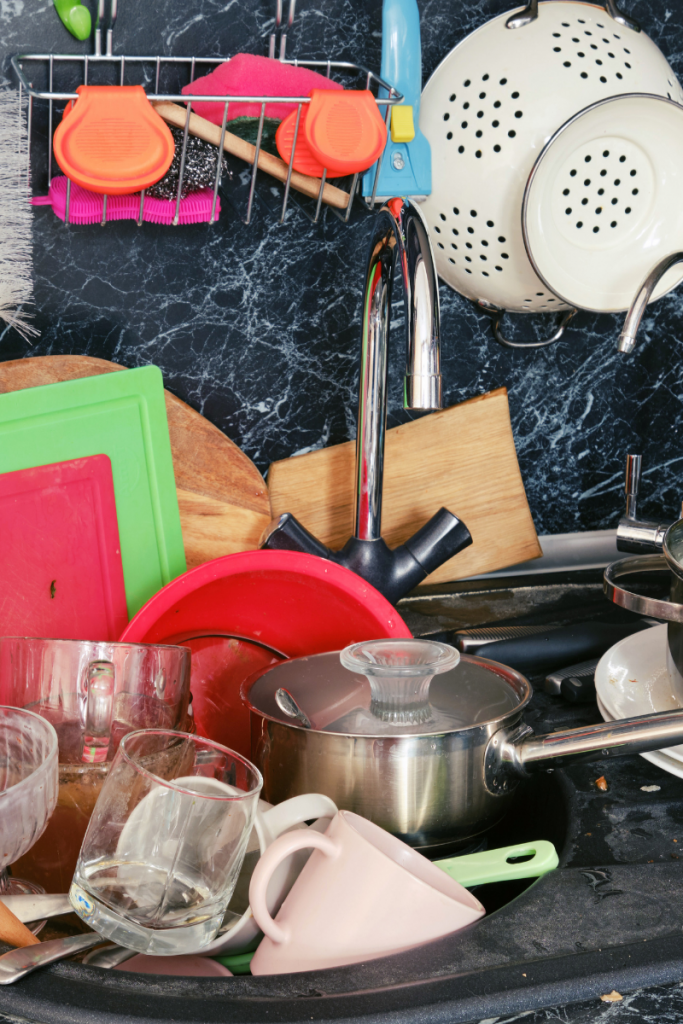Has anybody else been binge-watching Get Organized with The Home Edit on Netflix? Between that and my new kitchen renovation, I’ve been in an organization frenzy. So it only felt fitting to have Christina Hidek on the podcast today, an attorney turned professional organizer who is passionate about structure, organization and creating custom systems that help people de-clutter their lives. Now I know you might be thinking…. professional organizer?! What does that have to do with money? I promise – it’s all related! In this episode, we’re discussing all the ways that clutter affects your finances as well as some quick tips to help you save money by getting more organized! Let’s dive in, shall we?
How clutter can affect your finances
As some of my long-time followers know, I personally struggle with ADHD. So when I have clutter, it greatly impacts my mood. Not only that, It impacts the way I respond to my family and the way that I treat myself. I think it’s because my mind already feels so cluttered in the first place that when my physical space is cluttered, and especially if it’s not my clutter, I can’t function very well. When I don’t function very well, I don’t make the best decisions – especially when it comes to money. So I fully believe that clutter and organization can impact our money. I wanted to get the perspective of a professional, though! That’s why I asked Christina to describe her own beliefs on how clutter impacts your finances:

“Absolutely. It directly impacts it. So, you have the very real consequence of: you get hit with a late fee because you can’t find the bill pay. And that impacts your credit negatively, which makes it more expensive…It also impacts your money because clutter ties up your money. So, if you are a person that says, “you know what, I can’t find that pair of scissors….I’m at Target, I’m just gonna buy another pair.” Now you’ve invested in how many pairs of scissors? And these are all low cost little things that add up in a big way… So it hits you in lots of different ways that I think people don’t really realize because they’re most of the time minor. And so people just write it off. It’s just like the cost of living…” -Christina Hidek
When Christina said this, I was instantly reminded that around four years ago, my car registration sticker was buried in a mound of junk mail that I never got around to clearing out of my entryway basket…for SIX months. Long story short, I got pulled over one day and the officer gave me a ticket. My lack of organization directly led to me having to take a day off of work, go to court, and pay a fine. Not fun. And not worth the headache!
Christina goes on to describe that this incidence cost me more than just money, but it cost me time: “Time is money, right? Especially if you’re self-employed. You can’t be making money if you’re spending time looking for things. Or, you’re losing out on clients because they come to your office and they’re like, ‘I don’t think you’re competent because you have piles of junk everywhere.’ That’s a very real thing.”Really, it comes down to this: you can’t afford not to get more organized. So, here’s some quick tips on how you can get started today!
3 Quick Tips to Become More Organized
Get focused
“The primary way to stay on top of everything is just to take action on the daily. So one, set a timer for 15 minutes on your microwave and just do nothing but put things away where they go just for 15 minutes. You’re going to stack up all of the magazines together, you’re going to put away all the mail…maybe you don’t have a system for keeping up with your mail, but you’re going to get it all in one place…And then at the end of the 15 minutes, you’re going to find that… you can really concentrate your efforts and get a lot more done than if you weren’t so purposeful with your time….So the bottom line is you can do anything for 15 minutes. You can maintain focus for 15 minutes. And that’s by setting a timer. And then sticking with it for that amount of time and just trying to beat the clock, like a little personal game. You just get so much more done. And for me, it’s motivating because I know it’s only 15 minutes. You can carve out 15 minutes of your day. I don’t care how busy your schedule is. You don’t even have to do it 15 minutes all at once if you really can only do 10 minutes in the morning and five minutes at night, you know, break it up.” -Christina Hidek
The 2 Minute Rule
“Another correlating rule is the two minute rule…if something is going to take you two minutes or less. Just go ahead and do it. So like, go through your mail and just start pulling everything out that’s recycle-able. Just do it when it’s in your hands. Don’t set it down. Because if you set it down, then something else is going to go on top of it… It’s going to take you the least amount of time when it’s in your hands right that first time that you’re seeing it. So like responding to a party invitation or a wedding invitation, how long does it take to fill out that little RSVP card?” -Christina Hidek
If you’re like me, you might find yourself saying “Oh, I’ll do that later, it only takes me 2 minutes!” Then a couple days later I’m so overwhelmed with my list that I’m like, “Oh, I can’t do any of that! It’s too much! I’m just going to sit down and watch Netflix.” Because by that time, all those small tasks have piled up and they’re going to take me twice as long to complete them which requires a lot more focus than I am able to give. I think a lot of people do this with their money in regards to tracking their expenses…myself included! For instance, as long as I track my spending every single day, it takes me less than five minutes. However, over the past week, I have not tracked daily! Guess what? I had to sit down last night for at least 30 minutes to track all of our spending, all of our transactions from the past week. I was miserable. I was mad at myself. I was frustrated. If I had just taken 5 minutes to track my expenses daily, I wouldn’t have been put in a situation where I had to take an entire half hour to get my money in order. And I’m someone who has been doing this for 10 plus years!

Evaluate What You Really Want and Set Artificial Limits
“I always one thing I tell clients is you can’t love everything. If you love everything, then you love nothing. We need to set limits so that they can prioritize…So here’s a box…you can keep everything that fits in here…So you’re setting an artificial limit” It’s really about “learning those skills of prioritizing what’s really important and letting go. I can relate this so easily to money. When you’re looking over your expenses, ask yourself:
- What am I spending money on?
- Are these things truly my priority?
- Are they important to me?
- Am I actually using this?
- Is this even bringing me any joy?
- Do I actually want this?
Because like Christina mentions, there’s a disconnect between what we think we want and what we really actually want. Before my husband and I were married, he paid six months for a gym membership that he didn’t even know he had, much less use. Why? Because his finances were disorganized. Had there been organization there, he would have been able to see that purchase and realize that he’s not even using the membership. Then he would have been able to make an informed decision to let that expense go.
This is what my husband and I did with our cable bill years ago (before streaming services were all the rage!). We said, okay, are we really using cable? What are we watching? I was watching HGTV -that was it. That was the extent of our cable use. And so we let it go. And we got an antenna with the rabbit ears on the roof. And we looked crazy. But to us, it was worth it. So I love that I love the idea of doing that with not just not just stuff in your house, but what you spend money on as well. Because when you do that with what you spend money on, you bring less into your home, which means less to organize, less to deal with, less to clean. I’m all about that life! Christina agrees that more “stuff takes time and money to maintain. 1 in 12 Americans have a storage unit and they’re spending $1,000 on it a year!”
So what can YOU let go of today that’s actually costing you time, money, and mental space by keeping it around the house? If it actually has a place in your home, can you create a system to manage it, like your mail? I hope this interview inspires you to eliminate clutter so you can have more time and space for the things that bring you joy!
Today’s episode is brought to you by my FREE budgeting and debt payoff cheat sheet. In this cheat sheet I’m going to be giving you everything you need to kickstart your budget and start paying off debt fast. I’ll also be sharing with you how to find more money in your budget! You can grab it by signing up below!

